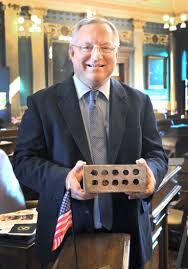Medical Pot Bringing $8.8M, 48 New Positions to Michigan State Police
They’ll enforce licensure mandates imposed by a 'seed to sale' regulatory regime authorized last year
By Evan Carter |June 5, 2017 |

Nearly $8.8 million of a proposed $33.1 million increase in the Michigan State Police budget next year would go toward hiring 48 new full-time employees to assist in medical marijuana licensure oversight, according to a House Fiscal Agency summary.
The new spending is related to the Medical Marihuana Facilities Licensing Act that became law in 2016, which imposes a number of new licensure mandates on growers, sellers and transporters, and delegates their enforcement to the state police. Money for enforcement will come from annual fees assessed to medical marijuana license-holders, according to state police spokeswoman Lori Dougovitol.
Of the 48 new employees, 30 would work in investigations, eight in forensic science, seven in commercial vehicle enforcement, and three in intelligence operations. While there are some points of disagreement between the executive budget recommendation for the state police and what the House has advanced, hiring 48 new employees for medical marijuana regulation is not one of them.
A proposed 5 percent increase in overall state police spending next year also includes specific police training program additions ($1 million), a student safety hotline ($608,300) and traffic control at the Michigan International Speedway ($800,000).
Matt Abel, the executive director of Michigan NORML, an organization that works to end state prohibitions on marijuana, said he wasn’t surprised by the increased budget for state police medical marijuana oversight.
“We’re moving into licensing a newly regulated business, so it’s expected that we’d need inspectors to insure regulatory compliance.” He added, “I’m disappointed about how much law enforcement resources have been used to prosecute medical marijuana patients.”
According to the website Weedmaps, Michigan has about 200 medical marijuana dispensaries, which under the new marijuana law, could be considered provisioning centers requiring state licenses with annual renewals
In 2008, Michigan voters approved the Michigan Medical Marijuana Initiative, which legalized medical marijuana use and allowed caregivers to grow limited amounts for patients. (State statutes use the anachronistic spelling of “marihuana” to maintain consistency with older laws.)
 I think that this quote from the comments section sums it up nicely:
I think that this quote from the comments section sums it up nicely:
"This new govt spending smells funny. The story is missing critical info.
- State police spokeswoman Lori Dougovitol so confidently predicts the new pot fees will cover this new $8.8 million in spending - what are the independent estimates of those fees?
- Don't we already have plenty of law enforcement dedicated to pot enforcement? Are they somehow disappearing?
- If medical pot is legal then it would seem to need regulatory inspectors, *not* State Police law enforcement.
This new bureaucracy is yet another fake justified expansion of state government. And yet another waste of taxpayer money."
They’ll enforce licensure mandates imposed by a 'seed to sale' regulatory regime authorized last year
By Evan Carter |June 5, 2017 |

Nearly $8.8 million of a proposed $33.1 million increase in the Michigan State Police budget next year would go toward hiring 48 new full-time employees to assist in medical marijuana licensure oversight, according to a House Fiscal Agency summary.
The new spending is related to the Medical Marihuana Facilities Licensing Act that became law in 2016, which imposes a number of new licensure mandates on growers, sellers and transporters, and delegates their enforcement to the state police. Money for enforcement will come from annual fees assessed to medical marijuana license-holders, according to state police spokeswoman Lori Dougovitol.
Of the 48 new employees, 30 would work in investigations, eight in forensic science, seven in commercial vehicle enforcement, and three in intelligence operations. While there are some points of disagreement between the executive budget recommendation for the state police and what the House has advanced, hiring 48 new employees for medical marijuana regulation is not one of them.
A proposed 5 percent increase in overall state police spending next year also includes specific police training program additions ($1 million), a student safety hotline ($608,300) and traffic control at the Michigan International Speedway ($800,000).
Matt Abel, the executive director of Michigan NORML, an organization that works to end state prohibitions on marijuana, said he wasn’t surprised by the increased budget for state police medical marijuana oversight.
“We’re moving into licensing a newly regulated business, so it’s expected that we’d need inspectors to insure regulatory compliance.” He added, “I’m disappointed about how much law enforcement resources have been used to prosecute medical marijuana patients.”
According to the website Weedmaps, Michigan has about 200 medical marijuana dispensaries, which under the new marijuana law, could be considered provisioning centers requiring state licenses with annual renewals
In 2008, Michigan voters approved the Michigan Medical Marijuana Initiative, which legalized medical marijuana use and allowed caregivers to grow limited amounts for patients. (State statutes use the anachronistic spelling of “marihuana” to maintain consistency with older laws.)
 I think that this quote from the comments section sums it up nicely:
I think that this quote from the comments section sums it up nicely:"This new govt spending smells funny. The story is missing critical info.
- State police spokeswoman Lori Dougovitol so confidently predicts the new pot fees will cover this new $8.8 million in spending - what are the independent estimates of those fees?
- Don't we already have plenty of law enforcement dedicated to pot enforcement? Are they somehow disappearing?
- If medical pot is legal then it would seem to need regulatory inspectors, *not* State Police law enforcement.
This new bureaucracy is yet another fake justified expansion of state government. And yet another waste of taxpayer money."

